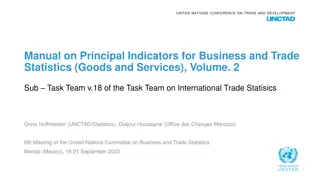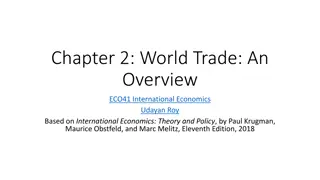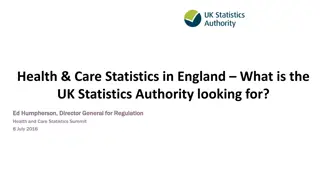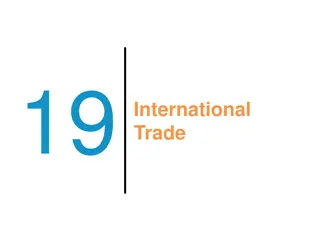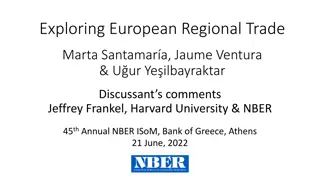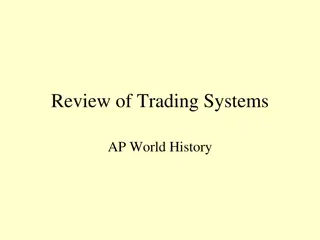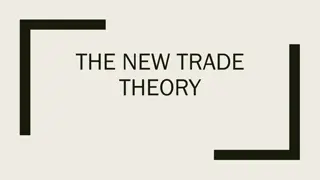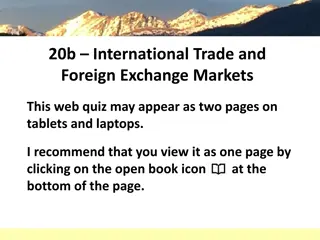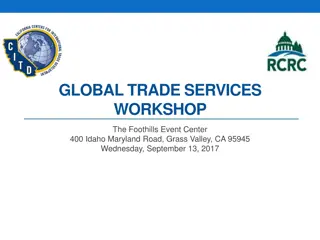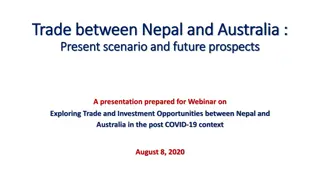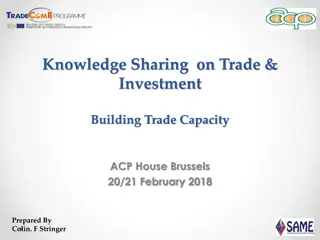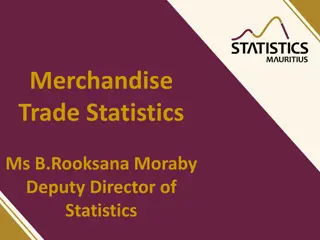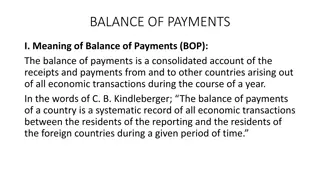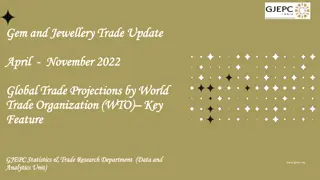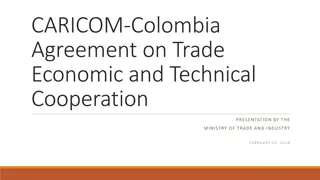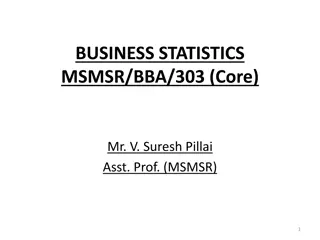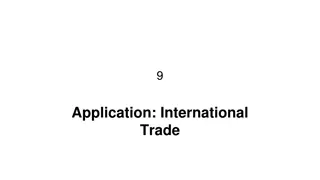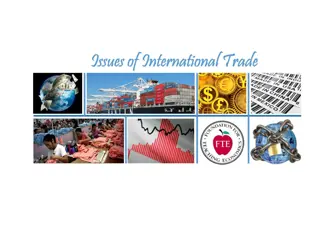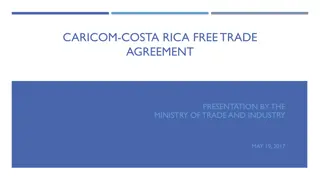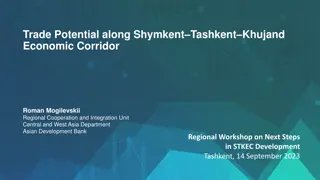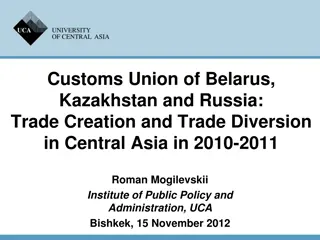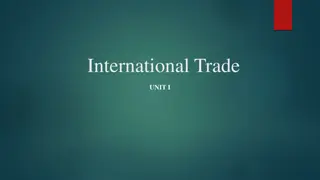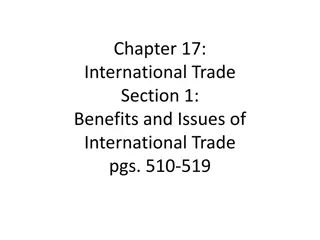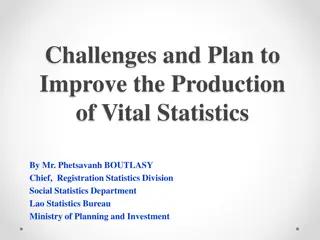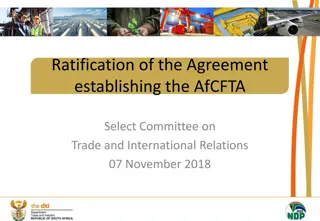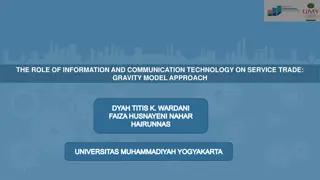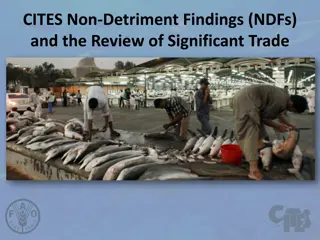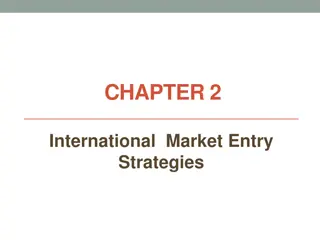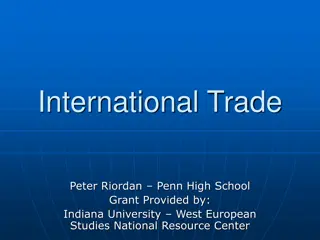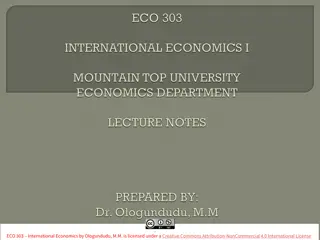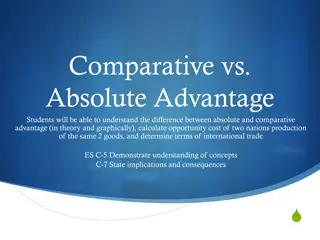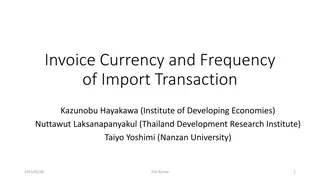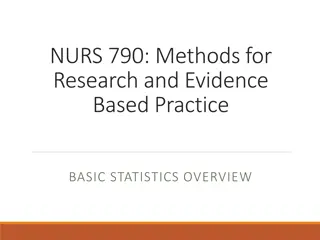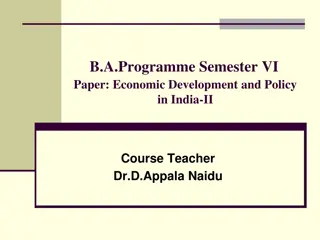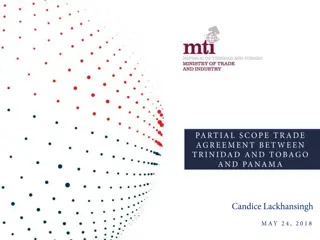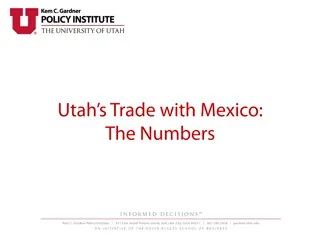International Merchandise Trade Statistics Workshop Overview
Presentation by Nilima Lal at the International Merchandise Trade Statistics Workshop in Nadi, Fiji focusing on the compilation, analysis, and dissemination of trade data. The workshop emphasizes the importance of relevant information on imported and exported goods, development partners collaborating to establish a trade commodity database, and the formation of working groups to enhance data collection and dissemination. The database will contain detailed trade data at the Harmonized Commodity Description and Coding System (HS) level, including information on trade types, countries of origin/destination, commodity descriptions, quantities, and values.
Download Presentation

Please find below an Image/Link to download the presentation.
The content on the website is provided AS IS for your information and personal use only. It may not be sold, licensed, or shared on other websites without obtaining consent from the author. Download presentation by click this link. If you encounter any issues during the download, it is possible that the publisher has removed the file from their server.
E N D
Presentation Transcript
INTERNATIONAL MERCHANDISE TRADE STATISTICS WORKSHOP ON COMPILATION, ANALYSIS, DISSEMINATION, INDICATORS AND USES 5 10 December 2022, Nadi, Fiji Presentation by Nilima Lal Economic Statistics Adviser, Pacific Community Email: NilimaL@spc.int
User needs User needs Relevant and timely information on goods that are imported and exported 2
What is available What is available 3
Development partners joining hands Development partners joining hands The need for a trade commodity database was raised by SPC in 2014. This was followed up with a meeting between SPC, PIFS and OCO in 2015. Discussions and work have been going on since then to provide an enabling environment to undertake this project Pacific HS is in place SPC now has a data scientist SPC has now in place the Pacific Data Hub where the data will be stored The project is a collaborative effort of SPC, PIFS, OCO and MSG who are assisted by UNCTAD and UNs Trade and Industry Statistics Section. 4
Working Group and sub-groups formed Organisation Member name Email Contact Organisation Member name Email Contact jayvee.santos@unctad.or g UNCTAD Mr Jayvee Santos Ms Irma Daphney Stone DaphneyS@ocosec.org OCO Mr John Sam JohnS@ocosec.org Vanuatu Customs Mr Kalory Sope ksope@vanuatu.gov.vu PIFS Mr Noah Patrick Kouback noahk@forumsec.org palatasah@customs.gov.t o Tonga Customs Mr Palatasa Havea MSG Ms Sovaia Marawa s.marawa@msg.int Fiji Bureau of Statistics Mr Pritesh Goundar pgounder@statsfiji.gov.fj tabuaka@kiribaticustoms .gov.ki Kiribati Customs Mr Tabuaka Naititi New Zealand Statistics Dr Ofa Ketu u Ofa.Ketu'u@stats.govt.nz lai.tugaga@pacerplus.o rg United Nations Mr Markie Muryawan muryawan@un.org Ms Lai Tugaga PACER Plus Implementation Unit Mr Michael THERIN Michael.Therin@abf.gov.au luke.marston@pacerpl us.org Mr Luke Marston Cody.Wilson@abf.gov.au Mr Cody WILSON davidab@spc.int Mr David Abbott Australian Border Force Konda.Valipi- Reddy@homeaffairs.gov.a u Ms Nilima Lal nilimal@spc.int SPC Mr Denis Grofils denisg@spc.int Mr Konda VALIPI REDDY Ms Margaux Le Maout margauxlm@spc.int 5
What the database will contain Trade data at the most disaggregated Harmonized Commodity Description and Coding System (HS) level in the shortest time possible by Date of border crossing Type of trade: imports, re-imports, exports and re-exports Country of destination/Country of origin 8-digit Harmonised Commodity Description and Coding System (HS) Description of the commodity Unit of measurement (UoM) Quantity Freight and insurance paid Statistical Value: imports (cif), re-imports (cif), exports (fob) and re-exports (fob) 6
Source of data The data will to be sourced from the Customs Administrations using a DLA with support from the OCO. Using a common customs management system would facilitate the standardization of regional reports and data elements and establish timely compilation of trade statistics The following caveats with respect to the exhaustiveness and the quality of the data will need to accompany the PACComtrade database: 1. PACComtrade database is a trade database and not IMTS i.e. these data are used for compiling IMTS and sometimes are supplemented with data from other sources. 2. The trade data provided may include commodities that are not considered trade e.g. currency in circulation. As such the total value of trade for a period in the PACComtrade database may differ slightly from the IMTS total value of trade for the same period released by the countries. Data on specific commodities should not differ. 7
Hosting of the PACComtrade database PACComtrade will be hosted at the SPC : The data will we stored in the Pacific Data Hub Indicator database here: https://stats.pacificdata.org/ and content will be harvested and displayed in the Pacific Data Hub main catalogue here: https://pacificdata.org/ A dashboard to better visualise the data will be developed down the track as well. 8
Status of the work OCO, UNCTAD and SPC are at the stage of sourcing the data. Meeting of SPC, OCO and UNCTAD with Fiji Customs was held on 12 September. DLA has been given to them. Once the DLA is signed technical meetings will be organised between FRCS, UNCTAD and SPC to agree on practical modalities for data extraction and transmission and pilot the process. FRCS will be the first partner implementing the process so some adjustment might take place based on experience. Lessons learned with Fiji during this initial implementation will be used when rolling out the PACComtrade data exchange with other Pacific countries. Floor open for UNCTAD and OCO to add comments 9
Thank you 10



